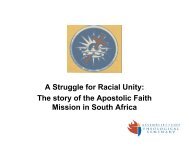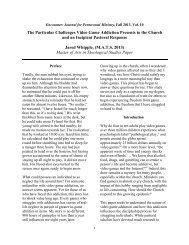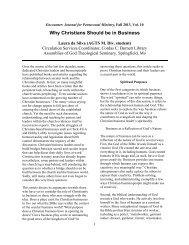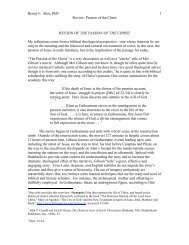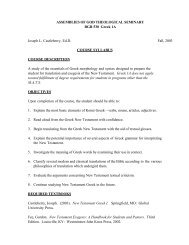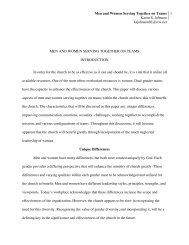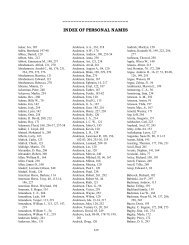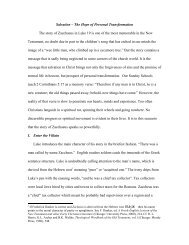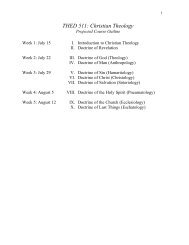Encounter: Journal for Pentecostal Ministry - Assemblies of God ...
Encounter: Journal for Pentecostal Ministry - Assemblies of God ...
Encounter: Journal for Pentecostal Ministry - Assemblies of God ...
You also want an ePaper? Increase the reach of your titles
YUMPU automatically turns print PDFs into web optimized ePapers that Google loves.
There can be little doubt that <strong>Pentecostal</strong><br />
thought has never been monolithic. But the<br />
current differences in contemporary<br />
<strong>Pentecostal</strong> and Charismatic teachings largely<br />
find their initial reflections in sincere<br />
theological attempts to deal with the new and<br />
pr<strong>of</strong>ound religious experience early<br />
<strong>Pentecostal</strong>s confronted during the first three<br />
decades <strong>of</strong> the twentieth-century. Most all <strong>of</strong><br />
the points <strong>of</strong> theological contention had long<br />
been under considerable discussion prior to<br />
the initial adoption <strong>of</strong> what would become the<br />
Statement <strong>of</strong> Fundamental Truths in the<br />
original 1927 <strong>Assemblies</strong> <strong>of</strong> <strong>God</strong> constitution<br />
and by-laws.<br />
One example <strong>of</strong> vital contribution to<br />
contemporary <strong>Pentecostal</strong> issues is the<br />
recorded teaching <strong>of</strong> Maria Woodworth-Etter.<br />
While she laid important groundwork <strong>for</strong><br />
expectation <strong>for</strong> a fresh outpouring <strong>of</strong><br />
<strong>Pentecostal</strong> power as early as 1894, she also<br />
challenged traditional Christian thinking on<br />
the role <strong>of</strong> women in ministry. It was not a<br />
case <strong>of</strong> her challenging Christian<br />
traditionalists merely by her own practice <strong>of</strong><br />
outstanding ministry as others have <strong>of</strong>ten done<br />
since, but Woodworth-Etter openly confronted<br />
a chauvinistic Christian society. This<br />
undoubtedly helped the first generation <strong>of</strong><br />
modern <strong>Pentecostal</strong>s more readily value<br />
women in ministry. But the struggle in<br />
<strong>Pentecostal</strong> ranks on this matter continues.<br />
Moderns would be wise to witness her<br />
argumentation as laid out in part in Jacobsen’s<br />
work.<br />
A second example <strong>of</strong> Jacobsen’s work is his<br />
discussion <strong>of</strong> the “initial evidence”<br />
controversy as traced back to Charles Parham<br />
and F. F. Bosworth. Parham was the first to<br />
declare tongues-speaking to be the initial<br />
2<br />
evidence <strong>of</strong> Spirit-baptism. Bosworth, one <strong>of</strong><br />
the 1914 founders <strong>of</strong> the AG, contended that<br />
tongues were but one sign <strong>of</strong> Spirit-baptism<br />
and <strong>of</strong>fered that many non-tongues-speakers<br />
had been more dramatically used <strong>of</strong> <strong>God</strong> than<br />
many tongues people he had known.<br />
Bosworth’s 1917 challenge to the AG position<br />
and subsequent defrocking is included in the<br />
text.<br />
Douglas Jacobsen presents the essential<br />
argumentation <strong>of</strong>fered by these sixteen pillars<br />
in a succinct and highly useful manner. My<br />
criticism <strong>of</strong> his work would center on his<br />
conviction that early <strong>Pentecostal</strong>s were<br />
immersed in dispensationalism along with<br />
much <strong>of</strong> the Evangelical world. But it appears<br />
the <strong>Pentecostal</strong> fascination with Darby/<br />
Sc<strong>of</strong>ield dispensationalist thought only begins<br />
to crystallize with Frank Boyd in 1925 and<br />
was later more fully expounded in AG circles<br />
by E. S. Williams and Ralph Riggs in the<br />
1930s, 1940s, and 1950s. I was disappointed<br />
not to find George Floyd Taylor’s and David<br />
Wesley Myland’s teachings on the deep sense<br />
<strong>of</strong> <strong>Pentecostal</strong> fraternity with the Zionist<br />
movement mentioned, apart from a brief<br />
“Latter Rain” allusion to nineteenth-century<br />
rainfall. The sense <strong>of</strong> bond between early<br />
<strong>Pentecostal</strong>ism and the revival <strong>of</strong> the Jewish<br />
homeland generated a broad conviction <strong>of</strong><br />
fraternal twin restorations to first-century<br />
points <strong>of</strong> departure that would culminate in the<br />
Second Coming.<br />
Jacobsen seems to have fully overlooked the<br />
long-standing twentieth-century <strong>Pentecostal</strong><br />
sense <strong>of</strong> affinity with “All Israel.” Nonetheless,<br />
I believe his work should be a welcomed<br />
addition to any serious student <strong>of</strong> <strong>Pentecostal</strong><br />
history.



